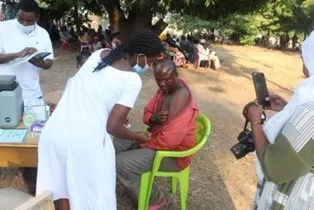
Since September 2021, CARE Tanzania has worked as a partner to the Government of Tanzania to improve vaccine access across the country. CARE’s logistical support has helped the government to cover large, underserved geographical areas. To increase vaccine uptake, CARE staff has also engaged local Community Health Workers (CHWs) to address vaccination misconceptions and developed improved health communication and data management tools. With these new resources, these health workers on the front lines have put in place two new strategies. First, COVID-19 vaccination is now integrated with other basic health services at local facilities. Second, the CHWs are now conducting targeted outreach informed by local concerns to address vaccine hesitancy in women and children. Now, not only are vaccinations being provided, CHWs have confirmed that women have increased their acceptance of vaccination shots.
The Sanchay Sathi mobile application represents a significant advancement in the digital empowerment of Village Savings and Loan Associations (VSLAs) in Bangladesh. Focused on the challenging environments of the char and haor regions, the app supports over 2000 VSLA groups, aiding in financial inclusion and economic enhancement through digital record-keeping and management. Read More
This brief discusses the Commonlands initiative in Uganda, which aims to modernize land rights and financial accessibility for rural communities. By leveraging digital tools and community-based verification systems, the program seeks to enhance land security and provide access to credit, empowering marginalized groups, particularly women. Read More
This brief highlights CARE Sierra Leone's partnership with MiKashBoks to enhance the efficiency and security of Village Savings and Loan Associations (VSLAs) through digital tools. The initiative focuses on improving financial management, digital literacy, and secure transactions, particularly benefiting women in rural communities by transitioning from manual to digital financial practices. Read More